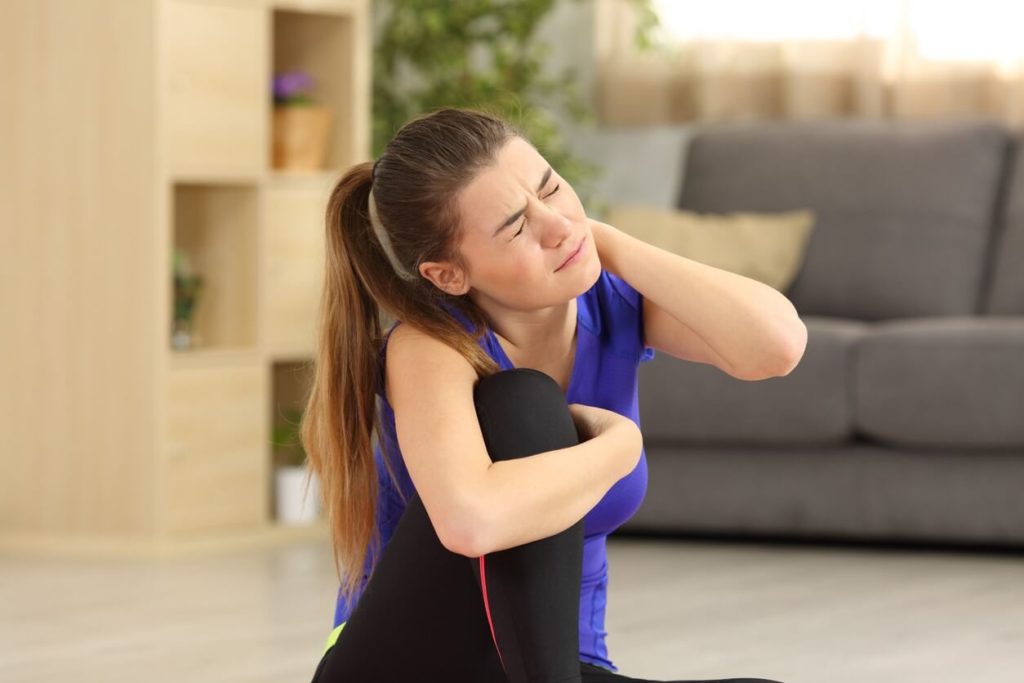Anxiety and muscle cramps: how to relax your muscles?
Written by: Loris Vitry (holistic coach)
Validated by: Cathy Maillot (Osteopath)
Caution: If you have any medical questions or concerns, please speak to your doctor. Even if the articles on this site are based on scientific studies, they do not replace professional medical advice, diagnosis or treatment.

The body is so well structured that each element that constitutes it has a very specific role.
Whether at the physical or mental level, each reaction of the body must challenge us.
If you injure yourself during physical activity, the brain records the information.
When this is repeated several times, the brain reacts in order to protect you from the danger it had registered before.
You will start to abstain from this activity at the risk of injuring yourself again.
This phenomenon is called anxiety.
To be clearer, anxiety is a reaction to something that scares you.
This will lead to avoidance behavior or intense emotions in the event of a confrontation.
Of course it is a natural mechanism, but it can be a hindrance for the rest of the body.
To this end, anxiety is one of the causes of the manifestation of muscle cramps.
In order to better relax your muscles in case of cramps, we will give you advice in this article.
We take stock.
Muscle cramps: what are they?
Cramps are sudden, painful muscle contractions.
They are involuntary and affect part or all of a muscle.
Most often it is the lower muscles that are affected.
Muscle cramps are usually brief, but with sharp pain.
These muscle discomforts are often due to stress or anxiety.
Muscle cramps caused by anxiety can affect multiple muscles.
These are able to migrate from one muscle group to another.
In anxiety, the muscles most affected by cramps are those of the neck, chest, and legs.
The muscles of the digestive system can also be affected, but these are rare cases.
Even though muscle cramps are unbearable, they are not necessarily dangerous.
However, it can happen that they cause severe muscle tears.
To avoid getting there, you have to react quickly by relaxing the muscles.
How to relax the muscles?
Be relaxed!
There are many ways to relax your muscles.
So be prepared to use it to alleviate the problem.
Here are some tips to maintain your muscles and put an end to muscle cramps.
Drink cherry juice
Don’t we say that food is the basis of good health?
This is the reason why we start with this simple, natural and effective trick.
Whether you are an athlete or not, know that cherry juice reduces muscle stress and inflammation.
Some studies done on runners have proven the effectiveness of this natural remedy.
After drinking pre-run juice, subjects exhibited no post-run muscle stiffness.
This is explained by the composition of this drink.
Indeed, cherry juice has anti-inflammatory properties and is very rich in antioxidants, hence its dark color.
Also, its contributions in essential minerals promote the balance of electrolyte levels, which keeps the muscles in good condition.
Don’t run straight to a supermarket to get some.
These contain preservatives and other chemicals.
So do it yourself.
To prepare your remedy, mix in a blender, seven sour cherries and 200 ml of water.
Do not add sugar or sweeteners.
Consume your juice twice a day, in the morning and in the evening.
Do not take it on an empty stomach.
Stretching
Here we have the most famous method for relaxing muscles.
Stretching allows the body to be relaxed, which relaxes the muscles.
Yoga stretches are recommended to make you less anxious and therefore less prone to muscle cramps.
In case the muscle is already paralyzed, a targeted stretch will bring you comfort.
Indeed, during a cramp, the affected muscle suffers from an accumulation of calcium in the muscle cell.
Stretching the muscle will allow you to lift the muscle spasm.
So you will be relieved of the pain, since the stretching opposes the mechanical effects of the contracture.
For example, if the cramp affects a lower limb, first, gently perform passive flexion of the foot.
Then, pull on the toes while raising the foot, to stretch the muscle fibers of the calf.
Finally lightly massage the affected area.
Also it should be added that after a stretching the cramp stops immediately.
As for the pain, it can drag on for twenty to thirty minutes, even an hour.
But it’s numbers vary from person to person.
Take a hot bath
Hot water helps muscle fibers to release tension.
This technique dates from 2000 years BC.
It was used to relieve soldiers after training and battles.
In addition to relaxing the whole body, hot baths reduce muscle tension and pain.
Natural hot springs are recommended.
But it is not easy to be near a source when a cramp starts.
So, to have the same effectiveness, add Epsom salt to the hot water used for the bath.
This will allow the nervous system to relax and relieve stress.
In addition, this mixture will help “suck” toxins from the muscles.
You can also add a few drops of essential oil to your bath.
For example, the essential oils of chamomile and lavender.
These relieve sore and tight muscles.
Consume valerian
It is a plant native to Asia and Europe.
It is used to reduce hysteria, stress, anxiety, and cramps.
It is effective in the case of acute cramps that last.
Highly prized for its relaxing properties, this herb is able to calm tense muscles, relieve spasms and reduce pain.
This effectiveness is explained by the presence of active ingredients with sedative effects contained in the plant.
Valerian slows down nerve impulses, thus creating muscle relaxation.
This herb is an interesting alternative to relax a muscle.
We recommend that you take two capsules in case of muscle cramps.
For best results, it is best to gently massage the affected area after taking the capsules.
However, this remedy is not recommended for pregnant and breastfeeding women.
Also, children under the age of twelve are prohibited from consuming it.
Finally, you now know how to relax your muscles so that you no longer suffer from cramps.
Follow these tips to the letter, but with caution.
Also remember to hydrate yourself better.
However, do not hesitate to seek advice from your doctor.
Continue reading:
Stress and horseback riding: how to stop being afraid of jumping on horseback?

